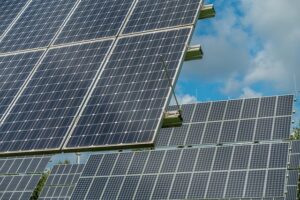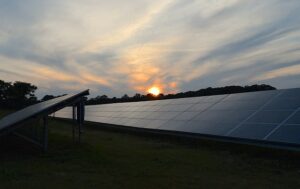
Solar Panels: Your Guide to Choosing the Right Type
The adoption of solar energy has been rapidly increasing as a sustainable and eco-friendly solution to energy consumption. With the growing demand for renewable energy, many homeowners and businesses are considering solar panels as a viable option. However, with a variety of types available on the market, choosing the right solar panel can be overwhelming. In this guide, we will explore the different types of solar panels, factors to consider when making your choice, and the benefits of solar energy.
Understanding Solar Panel Types
Solar panels can be primarily categorized into three types: monocrystalline, polycrystalline, and thin-film. Each type has its own unique characteristics, advantages, and drawbacks. Understanding these differences is essential for making an informed decision.
Monocrystalline Solar Panels
Monocrystalline solar panels are made from single-crystal silicon, which is the purest form of silicon used in solar cells. These panels are recognizable by their black color and rounded edges.
Advantages:
- Higher efficiency: Monocrystalline panels typically have an efficiency rate of 15% to 20%, making them the most efficient option available.
- Space-efficient: Due to their high efficiency, monocrystalline panels require less space to produce the same amount of energy as other types.
- Longevity: These panels tend to have a longer lifespan, often exceeding 25 years.
- Better performance in low-light conditions: Monocrystalline panels perform better in shaded or cloudy conditions compared to other types.
Disadvantages:
- Higher cost: Monocrystalline solar panels are generally more expensive due to the complex manufacturing process and the high purity of silicon used.
- Sensitivity to temperature: Their efficiency can decrease with higher temperatures.
Polycrystalline Solar Panels
Polycrystalline solar panels are made from multiple silicon crystals and have a bluish hue. They are created by melting silicon and pouring it into a mold, allowing it to cool and solidify.
Advantages:
- Lower cost: Polycrystalline panels are typically more affordable than monocrystalline panels, making them suitable for budget-conscious buyers.
- Environmental impact: The manufacturing process for polycrystalline panels tends to produce less waste compared to monocrystalline production.
Disadvantages:
- Lower efficiency: These panels usually have an efficiency rate around 13% to 16%, meaning they require more space for the same amount of power output compared to monocrystalline panels.
- Less aesthetic appeal: The blue color and fragmented appearance of polycrystalline panels may be less visually appealing to some.
- Performance issues: Polycrystalline panels may perform less efficiently in low-light conditions compared to their monocrystalline counterparts.
Thin-Film Solar Panels
Thin-film solar panels are made by depositing a thin layer of photovoltaic material onto a substrate. They are lightweight, flexible, and are often used in specialized applications, such as on building rooftops or in portable solar devices.
Advantages:
- Lightweight and flexible: Thin-film panels are easier to install, especially on surfaces that cannot support heavy panels.
- Lower production costs: The manufacturing process is typically more cost-effective, resulting in lower prices for consumers.
- Performance in high temperatures: Thin-film panels often perform better in high temperatures than crystalline panels.
Disadvantages:
- Lower efficiency: Thin-film panels have the lowest efficiency rates, usually around 10% to 12%, requiring more space to generate the same power output.
- Shorter lifespan: These panels often have a shorter lifespan than crystalline panels, sometimes lasting only 10 to 20 years.
- Space requirements: Due to their lower efficiency, they require more installation space, which might not be feasible for all properties.
Factors to Consider When Choosing Solar Panels
After understanding the different types of solar panels, it’s crucial to consider several factors before making your choice. These factors ensure that you select the right solar panel system for your home or business.
Energy Needs
Your energy consumption is the most critical factor in deciding which type of solar panel to install. Start by analyzing your energy bills to determine your average monthly usage. By understanding your energy needs, you can calculate the total wattage required for your solar panel system.
Space Availability
Do you have enough space for your solar panel installation? Depending on the type of panels and your energy requirements, the available roof area will play a significant role in your decision. If you have limited space, you may want to consider installing high-efficiency monocrystalline panels.
Budget
Your budget for the solar panel system is another crucial aspect to consider. Monocrystalline panels, while highly efficient, tend to be the most expensive. If financing the upfront costs is a concern, polycrystalline or even thin-film options may be more suitable. Remember to factor in potential savings on energy bills, tax incentives, and long-term investment returns when weighing costs.
Inverter Types
The inverter is another key component of your solar power system, converting the direct current (DC) produced by solar panels into usable alternating current (AC) for your home. There are several inverter types, like string inverters, microinverters, and power optimizers. Your choice of panels may influence which inverter system you select.
Climate
Consider the climate of your region. If you live in a sunny area, any solar panel type will likely perform well. However, in regions with frequent cloud cover or extreme temperatures, you may want to prioritize high-efficiency panels or those that perform better in shaded conditions. Understanding your local weather patterns can help you make a more informed decision.
The Benefits of Solar Energy
Investing in solar energy provides numerous advantages beyond merely selecting the appropriate panels. Here are some compelling benefits associated with solar energy:
Environmental Impact
Solar energy is a clean and renewable resource. By harnessing the sun’s power, we can significantly reduce our reliance on fossil fuels, thus lowering greenhouse gas emissions and combating climate change. Renewable energy sources like solar are essential for reducing air pollution and preserving natural resources for future generations.
Reduced Energy Bills
One of the most immediate benefits of solar energy is the potential for lower energy bills. By generating your own electricity, you can reduce your dependence on your local utility provider, leading to substantial savings. In some cases, surplus energy production may also result in credits on your energy bill, further increasing savings.
Energy Independence
Investing in solar panels can help you achieve greater energy independence. By generating your electricity on-site, you are less susceptible to fluctuations in energy prices and interruptions in supply. This independence provides peace of mind and greater control over your energy needs.
Increased Property Value
Many homebuyers are increasingly looking for properties equipped with solar energy solutions. Installing solar panels can raise your property’s resale value and attract potential buyers. According to studies, homes with solar panel systems tend to sell faster and at higher prices than properties without them.
Incentives and Rebates
Government incentives, tax credits, and rebates associated with solar energy systems can significantly reduce the initial investment required. Many states offer financial incentives that further encourage homeowners and businesses to adopt solar technologies. Researching available programs in your area can enhance your potential savings.
Conclusion
Choosing the right type of solar panels involves understanding your energy needs, space availability, budget, and environmental factors. With three primary types of solar panels—monocrystalline, polycrystalline, and thin-film—each offers unique advantages and drawbacks to consider. Ultimately, the transition to solar energy can lead to environmental benefits, financial savings, energy independence, and increased property value. As renewable energy continues to thrive, venturing into solar power becomes not just a beneficial choice but an essential one for a sustainable future.
As you embark on your solar journey, take the time to conduct thorough research, consult with solar energy professionals, and evaluate your options wisely. Adopting solar energy is a critical step towards building a more sustainable world.



